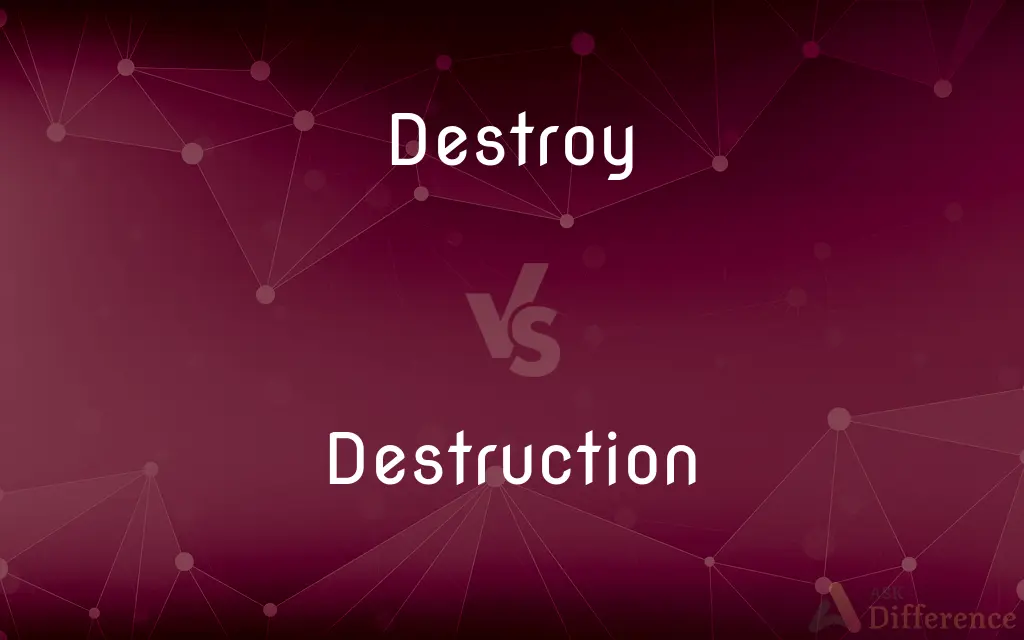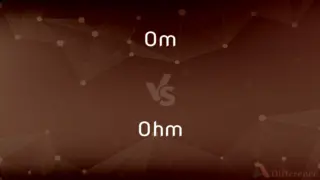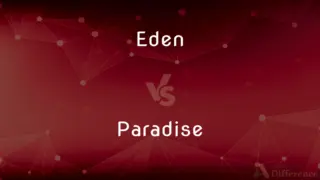Destroy vs. Destruction — What's the Difference?
By Fiza Rafique & Urooj Arif — Updated on March 28, 2024
Destroy is a verb that refers to the act of causing significant damage or ruining something, while destruction is a noun that describes the state or outcome of something being destroyed.

Difference Between Destroy and Destruction
Table of Contents
ADVERTISEMENT
Key Differences
Destroy emphasizes the action or process involved in causing something to cease to exist or to become unusable or not functional. It involves an active role in changing the state of an object, concept, or structure from existence to non-existence or from intact to ruined. On the other hand, destruction is the result or the condition that follows from the act of destroying. It is the aftermath or consequence of the process initiated by the action to destroy.
When discussing the act of destroy, it implies the involvement of an agent or force that brings about change. This could be a natural phenomenon, a deliberate action by humans, or the result of an accident. Destruction, as a concept, focuses on the extent of damage or the severity of the outcome rather than the action itself. It encapsulates the total impact, including the emotional, physical, and environmental effects.
The usage of destroy is often found in contexts where the focus is on the process or intention behind the action, such as in strategic planning, conflict, or disaster management. For example, in a military strategy, the aim might be to destroy the opponent’s capability to fight. In contrast, destruction is used when referring to the aftermath and the extent of damage, such as in reports or analyses evaluating the destruction caused by a natural disaster or war.
Both terms, while related, serve different purposes in language and thought. Destroy as a verb conveys the action or intention to cause damage, while destruction as a noun captures the scale and implications of the damage caused. This distinction is crucial in discussions about causality, responsibility, and the evaluation of impacts in various fields such as environmental science, ethics, and law.
The relationship between destroy and destruction is sequential and causal: the act of destroying leads to the state of destruction. Understanding this relationship helps in analyzing processes, outcomes, and responsibilities related to damaging events and actions.
ADVERTISEMENT
Comparison Chart
Part of Speech
Verb
Noun
Focus
Action or process of causing damage
Outcome or state resulting from damage
Implication
Involvement of an agent or force
Extent and impact of damage
Usage Context
Strategic planning, conflict, disaster management
Aftermath evaluation, impact analysis
Example
"They plan to destroy the old bridge."
"The destruction of the forest was extensive."
Compare with Definitions
Destroy
To defeat utterly.
The team was destroyed in the final match.
Destruction
The state of being destroyed.
The city lay in destruction after the earthquake.
Destroy
To remove or eliminate.
The goal is to destroy all invasive species in the area.
Destruction
The process of causing significant damage or ruin.
The destruction of the habitat led to species loss.
Destroy
To cause significant emotional or physical harm.
The news destroyed her emotionally.
Destruction
The outcome of a destructive event.
The destruction was so severe that rebuilding was necessary.
Destroy
To ruin the structure, condition, or usefulness of something.
The virus destroyed the computer's hard drive.
Destruction
The extent or total effect of damage.
The report detailed the destruction caused by the storm.
Destroy
To cause something to cease to exist.
The fire destroyed the ancient manuscripts.
Destruction
The act of destroying something.
The destruction of evidence was a serious offense.
Destroy
To break apart the structure of, render physically unusable, or cause to cease to exist as a distinguishable physical entity
The fire destroyed the library. The tumor was destroyed with a laser.
Destruction
The action or process of causing so much damage to something that it no longer exists or cannot be repaired
The destruction of the rainforest
The avalanche left a trail of destruction
Destroy
To put an end to; eliminate
“In crowded populations, poverty destroys the possibility of cleanliness” (George Bernard Shaw).
Destruction
A group of wild cats.
Destroy
To render useless or ruin
Felt that an overemphasis on theory had destroyed the study of literature.
Destruction
The act or process of destroying
The destruction of the house was completed in two days.
Destroy
To put to death; kill
Destroy a rabid dog.
Destruction
The condition of having been destroyed
Destruction from the tornado was extensive.
Destroy
To subdue or defeat completely; crush
The rebel forces were destroyed in battle.
Destruction
The cause or means of destroying
Weapons that could prove to be the destruction of humankind.
Destroy
To cause emotional trauma to; devastate
The divorce destroyed him.
Destruction
The act of destroying.
The destruction of the condemned building will take place at noon.
Destroy
To be destructive; cause destruction
“Too much money destroys as surely as too little” (John Simon).
Destruction
The results of a destructive event.
Amid the seemingly endless destruction, a single flower bloomed.
Destroy
(ambitransitive) To damage beyond use or repair.
The earthquake destroyed several apartment complexes.
Hooligans destroy unprovoked.
Destruction
The act of destroying; a tearing down; a bringing to naught; subversion; demolition; ruin; slaying; devastation.
The Jews smote all their enemies with the stroke of the sword, and slaughter, and destruction.
'Tis safer to be that which we destroyThan by destruction dwell in doubtful joy.
Destruction of venerable establishment.
Destroy
(transitive) To neutralize, undo a property or condition.
Smoking destroys the natural subtlety of the palate.
Destruction
The state of being destroyed, demolished, ruined, slain, or devastated.
This town came to destruction.
Thou castedst them down into destruction.
Destroy
(transitive) To put down or euthanize.
Destroying a rabid dog is required by law.
Destruction
A destroying agency; a cause of ruin or of devastation; a destroyer.
The destruction that wasteth at noonday.
Destroy
(transitive) To severely disrupt the well-being of (a person); ruin.
Her divorce destroyed her; she had a nervous breakdown and was severely depressed for more than a year.
Destruction
Termination by an act of destruction
Destroy
To defeat soundly.
Destruction
An event (or the result of an event) that completely destroys something
Destroy
To remove data.
The memory leak happened because we forgot to destroy the temporary lists.
Destruction
A final state;
He came to a bad end
The so-called glorious experiment came to an inglorious end
Destroy
To sing a song poorly.
Destroy
To exhaust duly and thus recreate or build up.
This exercise is going to destroy all parts of your shoulders.
Destroy
To unbuild; to pull or tear down; to separate virulently into its constituent parts; to break up the structure and organic existence of; to demolish.
But ye shall destroy their altars, break their images, and cut down their groves.
Destroy
To ruin; to bring to naught; to put an end to; to annihilate; to consume.
I will utterly pluck up and destroy that nation.
Destroy
To put an end to the existence, prosperity, or beauty of; to kill.
If him by force he can destroy, or, worse,By some false guile pervert.
Destroy
Do away with, cause the destruction or undoing of;
The fire destroyed the house
Destroy
Destroy completely; damage irreparably;
You have ruined my car by pouring sugar in the tank!
The tears ruined her make-up
Destroy
Defeat soundly;
The home team demolished the visitors
Destroy
As of animals;
The customs agents destroyed the dog that was found to be rabid
Common Curiosities
Is all destruction negative?
While often perceived negatively due to loss or damage, destruction can also lead to positive outcomes, such as the removal of hazardous structures or the renewal of ecosystems.
Can destruction occur without an intentional act to destroy?
Yes, destruction can result from natural events, accidents, or other processes not initiated by a deliberate act to destroy.
Can destruction be measured or quantified?
Yes, the extent of destruction can be measured in terms of physical damage, economic loss, environmental impact, or emotional distress.
How do natural disasters contribute to destruction?
Natural disasters such as hurricanes, earthquakes, and wildfires cause widespread destruction, impacting ecosystems, human settlements, and infrastructure, often with little to no possibility for prevention.
What psychological effects can the act of destroy or the state of destruction have on individuals and communities?
Both the act of destroying and witnessing destruction can have profound psychological effects, including trauma, grief, and loss. Recovery and healing processes vary widely among individuals and communities.
Can destruction lead to innovation or positive change?
Yes, in some contexts, destruction can clear the way for innovation and positive change by removing outdated structures or systems, allowing for new growth and development that better meets current needs.
How does destroy relate to similar verbs like demolish or dismantle?
Destroy is a more general term that can encompass both demolish (focused on physical structures) and dismantle (taking apart), reflecting a broader range of actions leading to destruction.
Does destruction always follow an act to destroy?
Yes, in a causal sense, destruction is the consequence or outcome of an act or process to destroy, though the initiating action may not always be intentional or direct.
Can destruction be reversed or mitigated?
Depending on the context, some forms of destruction can be mitigated, reversed, or repaired, though often at significant cost or effort.
Are there legal implications to destroy versus the state of destruction?
Yes, the act of destroying may carry legal responsibilities or consequences, especially if it results in harm or loss, while the state of destruction might necessitate legal action for recovery or compensation.
Is it possible to prevent destruction?
While not all forms of destruction can be prevented, particularly those resulting from natural events, many instances of destruction caused by human actions can be mitigated or avoided through careful planning, sustainable practices, and early intervention.
What roles do humans play in the processes of destroy and destruction?
Humans can be agents of destruction through deliberate actions like deforestation, war, and pollution, but they can also play positive roles in preventing or mitigating destruction through conservation, restoration, and peacekeeping efforts.
How do environmentalists view destruction in the context of ecological balance?
Environmentalists often view destruction through the lens of its impact on ecological balance, advocating for the preservation of natural habitats and opposing actions that lead to unnecessary destruction of ecosystems.
What legal measures exist to address or prevent destruction?
Legal measures to address or prevent destruction include environmental regulations, historical preservation laws, international treaties against acts of war that lead to destruction, and laws aimed at preventing deliberate harm to property and the environment.
How does the concept of destruction vary across cultures and histories?
Cultural and historical contexts significantly influence perceptions of destruction, with some viewing it as a necessary part of renewal or change, while others see it as a loss or tragedy to be avoided at all costs.
Share Your Discovery

Previous Comparison
Om vs. Ohm
Next Comparison
Eden vs. ParadiseAuthor Spotlight
Written by
Fiza RafiqueFiza Rafique is a skilled content writer at AskDifference.com, where she meticulously refines and enhances written pieces. Drawing from her vast editorial expertise, Fiza ensures clarity, accuracy, and precision in every article. Passionate about language, she continually seeks to elevate the quality of content for readers worldwide.
Co-written by
Urooj ArifUrooj is a skilled content writer at Ask Difference, known for her exceptional ability to simplify complex topics into engaging and informative content. With a passion for research and a flair for clear, concise writing, she consistently delivers articles that resonate with our diverse audience.













































